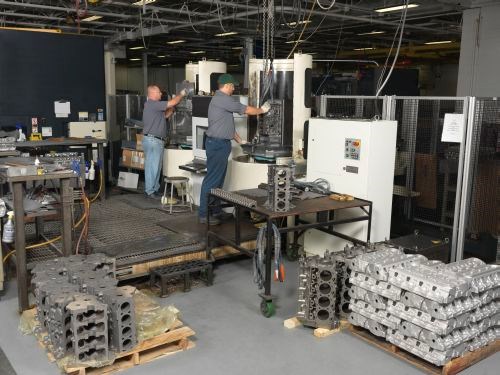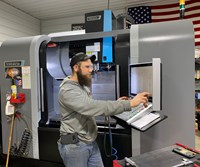Addressing the Skills Gap
According to Roush Industries Operations Manager Mel Koslowski, one way to address the skills gap is to expose kids to programs in high school that will pique their interest in manufacturing careers.

According to Roush Industries Operations Manager Mel Koslowski, one way to address the skills gap is to expose kids to programs in high school that will pique their interest in manufacturing careers. Roush is also investing in training its current employees to operate machines such as the Makino Machining Complex (MMC) cell above.
What matters most to Roush Industries is its people, so it bothers Operations Manager Mel Koslowski that in five to 10 years manufacturers are expected to experience a critical lack of skilled machinists. It is especially worrisome as the seasoned veterans who are currently leading companies begin to consider retirement.
“We definitely require high-tech machining systems like those from Makino for our production operations,” Mr. Koslowski says, “but we must also train people to use them. Even with automation, there will still be a need for a core group of people to engineer the parts, program and set up the machines to develop the prototypes that will eventually end up in production. We are seeing a growing gap between the availability of these jobs and the workers who possess these skills.”
Mr. Koslowski says that he has been to community colleges with impressive machine setups and great programs teaching the fundamentals of machining, but where these schools fall short is in recruiting high school students to join them. That is mostly because these days no industrial education courses are being taught in high schools—classes that traditionally piqued student’s interests and fed the career pipeline.
“Back in the day, I loved metal shop,” he says. “We learned the basics all through high school, and I really enjoyed that. It is the reason why I went into the machining industry. These days, high schools have closed their metal shops, so students have no idea that there’s another way to earn a living.”
Mr. Koslowski believes that there’s still a future in machining, and that students need to be informed of this—that they don’t necessarily have to go to college to be an administrator, businessperson or information technology professional.
“There are kids in this country that have natural talent with their hands,” he says. “They just need the exposure and to realize that these programs exist at their community colleges. They need to know that they could make a good living doing these types of jobs.”
In the meantime, Roush’s partnership with local schools and in developing its own training program has been successful, and Mr. Koslowski continues to challenge other industry leaders to help find a way to address the skills gap.
Related Content
-
Will the “Great Resignation” Become an Opportunity for Manufacturers? Get Ready for the Returning 3 Million
The Great Resignation will become a Great Reapplication when employees currently able to stay out of the workforce return to it looking for something better. Machining employers that are already evaluating candidates for fit, without demanding specific skills coming in, might be positioned well to draw upon this wave.
-
How to Grow the Business with Real-Time Job Status Data
ERP systems that focus on making data more accessible can improve communication within a shop, reducing wasteful errors and improving capacity.
-
Top Shop Builds Upon Employee Ownership for Future Success
In its quest to become the Fox Valley’s best-in-class employer, A to Z Machine has adopted an ESOP, expanded benefits and invested in apprenticeships.
















